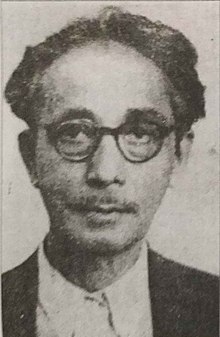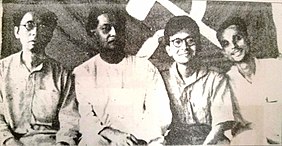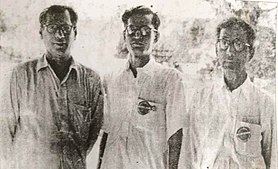| Revision as of 04:01, 17 December 2020 editMonkbot (talk | contribs)Bots3,695,952 editsm Task 18 (cosmetic): eval 5 templates: del empty params (6×);Tag: AWB← Previous edit | Revision as of 01:39, 21 December 2020 edit undoSer Amantio di Nicolao (talk | contribs)Autopatrolled, Administrators6,315,113 editsm Removing from Category:Indian communists in subcat using Cat-a-lotNext edit → | ||
| Line 53: | Line 53: | ||
| ] | ] | ||
| ] | ] | ||
| ] | |||
| ] | ] | ||
| ] | ] | ||
Revision as of 01:39, 21 December 2020
For other people with similar names, see Muzaffar Ahmed (disambiguation).
| Muzaffar Ahmad | |
|---|---|
| মুজফ্ফর আহ্মদ | |
 | |
| Born | (1889-08-05)5 August 1889 Sandwip, Chittagong District, Bengal Presidency, British India |
| Died | 18 December 1973(1973-12-18) (aged 84) |
| Nationality | Indian |
| Other names | Kakababu, Dwaipayana |
| Political party | Communist Party of India; Communist Party of India (Marxist) |
Muzaffar Ahmad (known as Kakababu; 5 August 1889 – 18 December 1973) was an Indian-Bengali politician, journalist and communist activist.
Background
Ahmed was born at Musapur village in Sandwip Island in Chittagong District of Bengal Province in the-then British India (in present-day Bangladesh) to Mansur Ali and Chuna Bibi. He passed matriculation from Noakhali Zilla School in 1913. In 1918, he was appointed joint secretary of "Bangio Musalman Sahitya Samiti". In 1920, along with Kazi Nazrul Islam he started a new magazine, Nabajug. Later, when another magazine, Dhumketu was launched by Nazrul in 1922, he contributed to it using the pseudonym "Dwaipayana".
Political movement
Ahmed was one of the founders of the Communist Party of India. In 1922, the Bharat Samyatantra Samiti was formed in Calcutta with Ahmed as its secretary. In 1924, he was sentenced to four years in prison because of his role in the Kanpur Bolshevik Conspiracy Case along with S.A. Dange, Nalini Gupta and Shaukat Usmani. He was released due to illness in 1925. In November, 1925 he, along with Kazi Nazrul Islam, Hemanta Kumar Sarkar, and others, organized the Labour Swaraj Party in Bengal. He was one of the main leaders of CPI in the early 1920's along with Abdul Halim and Abdur Rezzak Khan.


On 20 March 1929, the British colonial government arrested 31 labour activists and sent them to Meerut for trial. Ahmed was the chief accused, along with S.A. Dange, Shaukat Usmani, P.C. Joshi and others, was convicted in this so-called Meerut Conspiracy Case. He was released in 1936. He had served the longest term in jail as the chief accused in the Meerut Trial.

After the partition of India in 1947, Ahmed moved to Kolkata rather than staying in East Pakistan (now Bangladesh). On 25 March 1948, the Communist Party of India was banned by the Government of India and Ahmed was imprisoned. He was released from prison in 1951. He was again arrested and imprisoned for two years in 1962, and another time for two years in 1965. He was imprisoned several times in post-Independence India by the Congress government.
Personal life
Ahmed had a daughter, Nargis. She was married to the poet Abdul Quadir.
Death and legacy
Ahmed died in Calcutta in 1973, aged 84.
The headquarters of the Communist Party of India (Marxist) in West Bengal is named after him. Also, Ripon Street, a thoroughfare in Kolkata, was renamed "Muzaffar Ahmad Street".
Major works
- Qazi Nazrul Islam: Smritikatha (in Bengali)
- Amar Jiban O Bharater Communist Party (in Bengali)
References
- "Prof. Muzaffar Ahmed: An Interview". The Daily Star. 16 December 2014. Retrieved 5 March 2019.
- Roy, Ranjit (2012). "Ahmed, Comrade Muzaffar". In Islam, Sirajul; Jamal, Ahmed A. (eds.). Banglapedia: National Encyclopedia of Bangladesh (Second ed.). Asiatic Society of Bangladesh.
- Chattopadhyay, Suchetana (2011). An Early Communist: Muzaffar Ahmad in Calcutta. Tulika Books, Delhi. p. 86.
- Suchetana Chattopadhyay, An Early Communist: Muzaffar Ahmad in Calcutta, Tulika Books, Delhi 2011
- Mortuza Khaled, A Study in Leadership: Muzaffar Ahmad and the Communist Movement in Bengal, Progressive Publishers, Kolkata 2001
- Samsad Bangali Charitabhidhan. Shishu Sahitya Samsad. p. 575. ISBN 978-81-7955-135-6.
- ^ "Remembering Abdul Quadir: Life and Anecdotes". The Daily Star. 1 June 2019. Retrieved 1 June 2019.